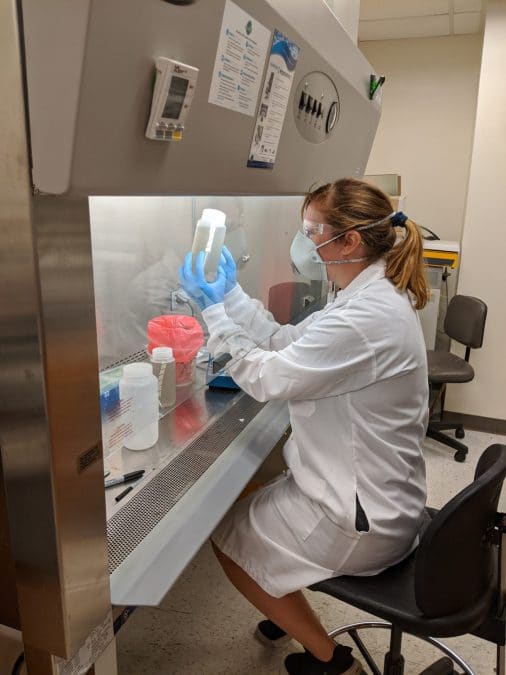COVID-19 has created a feeling of dread across the world, but for Citizen Potawatomi Nation tribal member and Pettifer family descendant Laura Scott, the pandemic opened an opportunity for her to utilize personal experience, expertise and education to fight for the greater good. As a Ph.D. student at Tulane University’s School of Public Health and Tropical Medicine, Scott currently studies wastewater to gain a greater understanding of how the virus can live and spread. She also volunteered as an epidemiologist for the City of New Orleans at the pandemic’s onset.

“It’s been such an opportunity to flex my expertise and be able to use it and do something really helpful,” Scott said during a phone interview with the Hownikan.
“Infectious disease and epidemiology is a pretty small field, and we were thrust into being needed so quickly. It’s been a unique opportunity.”
Scott graduated in 2011 with a degree in zoology from Oklahoma State University. For the next four years, she worked at the Oklahoma Medical Research Foundation in Oklahoma City.
“That’s where I got really interested in studying infectious diseases and realized that I wanted to get a graduate degree,” she said.
Scott received a master’s in epidemiology in 2016 from Tulane University’s School of Public Health and Tropical Medicine. Her experience inspired her to continue her education at Tulane University, where she is currently a Ph.D. candidate.
Response involvement
Early in the COVID-19 outbreak, Scott utilized her epidemiological background and mapped the virus as it spread across the Crescent City. She received names from the health department and contacted them by phone to check on their condition as well as determine potential exposure to others.
“Some of the work that went with contact tracing was very emotionally taxing for me,” she said.
Like most of the United States during the initial outbreak, New Orleans had very few tests, and only the extremely ill qualified to receive one.
“It’s heartbreaking to talk to these people and know that they’re becoming ill and there was just nothing we could do,” Scott said.
However, the virus spread quickly throughout New Orleans, and Scott was only able to track the virus for three days.
“There was no chance of keeping up with it,” she said. “We had gone from one case to three cases to just hundreds of cases.”
She then transferred her efforts back into research at Tulane, studying the virus in pre-treated wastewater from hospitals and the city.
“We know the virus is shed from people in their waste, so we expect to find it there,” she said. “And that’s part of one of the questions we’re going to try to answer is how long after people have been infected are we continuing to see that people are shedding it?”
Discovering solutions takes time, which is scarce during a pandemic.
“It’s all a little nerve wracking,” Scott said. “It’s all a little anxiety inducing.”
Scott is one of the leads on this interdisciplinary project, and she oversees most of the sampling and lab work within New Orleans. The team has concerns for the flooding that often accompanies hurricane season, which runs June through November.
“There are a lot of questions that could be answered by looking for the virus in wastewater and regular surface water — like lakes and rivers, and down here, bayous,” she said.
On top of flooding, New Orleans has a high percentage of citizens with conditions like diabetes and heart disease that put them in a high-risk category for COVID-19.
“Low socio-economic status is a huge problem here to begin with, and now it’s likely causing our mortality rate for this virus to be higher than other places,” she said.
While her work fighting the virus is important, she is thankful for those who are staying home and abiding by the guidelines set forth.
“Quite honestly, those people are the heroes where the rest of us are just doing our jobs,” Scott said. “I am lucky enough I still get to go to work every day, and I’m not going crazy. Everybody has a role to play in making this better, and all of it is very important.”
Find out more information about Tulane University’s efforts to combat COVID-19 at tulane.edu/covid-19.
